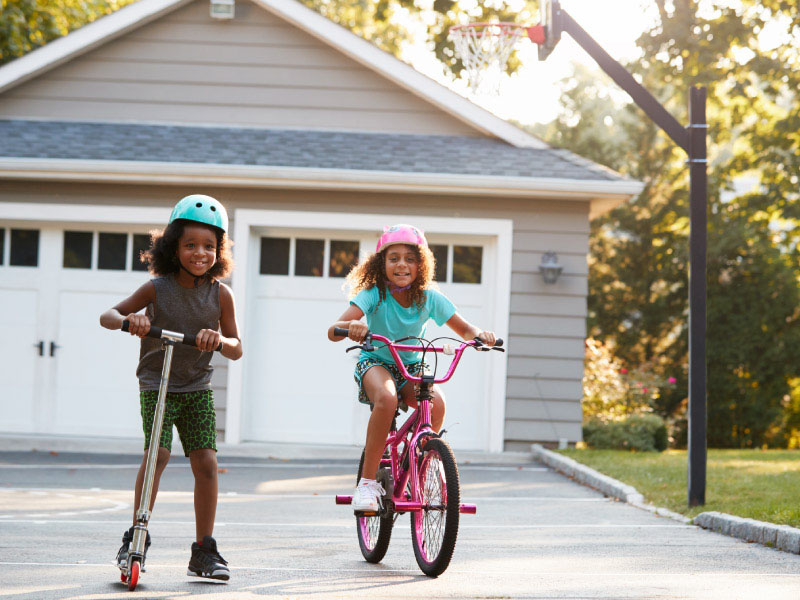As the pandemic wanes, get kids on the road to good health this summer
By Michael Precker, American Heart Association News

Nice weather and a receding pandemic should make for a joyous, memorable summer, especially after a year of lockdowns, frustration and discouraging news. For kids, and their parents, it's also a chance to get back on the road to normal after a long COVID-19 detour.
"I'm really optimistic about this summer compared to where we were last summer," said Dr. Miriam Vos, a pediatrician and professor at the Emory University School of Medicine and Children's Healthcare of Atlanta. "A lot of kids have had less activity and less healthy habits, and summer's going to be a nice opportunity to change that."
As a mother of two young children, nutrition specialist Alexis Wood is especially happy "that we're now coming out of this unprecedented hell."
But "let's not pretend all the stress is over," said Wood, of the U.S. Department of Agriculture's Children's Nutrition Research Center and Baylor College of Medicine in Houston. "I'm so glad we're thinking about getting our kids back to good health behaviors. But let's remember all of us, both adults and children, are still transitioning. Don't put undue pressure on yourself. Don't expect that just because the vaccine is here, we can make it go back to exactly how it was. This is the first step."
As families head into summer, here are suggestions on how to take those next steps wisely:
What's up, doc? If you put off going to the doctor during the pandemic, Wood said, "go get your health checks. Make sure your kids see the pediatrician."
That's especially true, Vos said, for children who might have jitters about re-emerging into normal life.
"The whole COVID thing was scary," she said. "There was a lot of bad news. Children who were already anxious may have even more concerns. If parents are seeing a lot of problems, that's something to see your doctor about."
Out you go! "Kids may have gotten used to being inside," Vos said. "Parents need to plan things outside and get back in the habit of being outside."
Besides the physical and mental health benefits of exercise, there's an added bonus: The Centers for Disease Control and Prevention says you're less likely to be infected by the coronavirus outside when fresh air is constantly moving.
No more COVID compensation. Either because of necessity or compassion, many parents with kids stuck at home pampered them with sugary snacks, bountiful screen time and other unhealthy indulgences.
The American Academy of Pediatrics warned in December that poor nutrition and decreased physical activity could harm children's health long-term, while a study published in May in the journal Pediatrics showed an uptick in childhood obesity during the pandemic.
"It's time to set more limits again," Vos said. "That may not be easy, but it's worth all that effort because it has such important long-term health benefits."
The S-word is structure. "More free time in the summer can mean less structure," said Dr. Elliot Davidson, medical director of the Cleveland Clinic Akron General Center for Family Medicine in Ohio. "But in addition to physical activity and a healthy diet, kids need a consistent bedtime, hopefully electronic-free, and a consistent dinner time. And they need good role models. It's hard because adults need to model the good behavior they want the kids to do, and we don't always want to do that."
But while setting boundaries is important, cautions Wood, being responsive to children's needs within those expectations is critical for long-term health.
Stay tuned. The CDC refines its COVID-19 recommendations as circumstances change, Wood said, so pay attention. "Trust the CDC and follow their guidelines."
And if you're traveling, Davidson said, "keep COVID in mind. People in different areas are in different places in terms of COVID, so be prepared for whatever rules are going to be enforced wherever you go."
This advice won't change. "I'm stressed about the vaccination reluctance I see," Davidson said. "Get yourself vaccinated, get your kids vaccinated as soon as they're eligible, get your parents vaccinated. This is part of being a good role model."
Keep your balance. "People should not be complacent," Davidson said. "We're not out of COVID yet. … But kids need to be kids. They need to get back to the job of being a kid. They can't hide in their basement all their lives. We have to get back to normal life, but we have to find the right balance. It's complicated, but that's what life's all about."
Editor's note: Because of the rapidly evolving events surrounding the coronavirus, the facts and advice presented in this story may have changed since publication. Visit Heart.org for the latest coverage, and check with the Centers for Disease Control and Prevention and local health officials for the most recent guidance.
If you have questions or comments about this story, please email [email protected].





